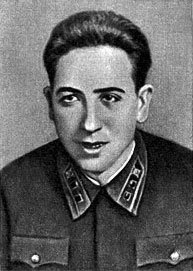
Rubén Ruiz Ibárruri

|
Taken and
translated from :
http://www.stalingrad-battle.ru/index.php?option=com_content&view=article&id=579&Itemid=17
International warriors
In those early years, Russia and Spain were much united. In 1936-1934,
Soviet soldiers and officers took part in the war in Spain, from where
fascism began its march through Europe. After the fighting, many Spanish
children were left orphans and were sent to the Soviet Union, where they
found a new homeland. When the Great Patriotic War began, the natives of
Spain could not stand aside. Seeing from the experience of their own
country, what disasters the fascist dictatorship could bring, they
whole-heartedly strove to fight against the Nazi troops. Fiercely hated
fascism and already having combat experience, the Spaniards were
excellent fighters. They were part of the partisan detachments,
organized acts of sabotage in the enemy's rear, fought on the front
lines, were gunners, pilots, and sappers. Courage, bravery…
The most famous Spaniard participating in the Great Patriotic War was
Ruben Ruiz Ibarruri, who was awarded the highest award of that time -
the title of Hero of the Soviet Union for his military exploits. Ruben
Ibarruri died during the Battle of Stalingrad and was buried in the very
center of our city - in the Square of Fallen Fighters.
Soviet childhood Ruben was the son of Dolores Ibarruri, an illustrious revolutionary, whose catch phrase "No pasaran!" - "They will not pass!" became the motto of the anti-fascist movement around the world. He was born in Muskitz, Navarra, Navarra, Spain . The boy was brought up in the spirit of the revolutionary struggle and from childhood he was used to not being afraid of anything. At thirteen years old, when Ruben and his mother arrived in Madrid, at the risk of being caught by the police, he distributed a party newspaper on the streets of the city, participated in anti-government demonstrations, and was connected between underground organizations.
The situation in Spain was heating up, and it was not safe for Dolores’s
children to remain in the country. After another arrest of his mother in
1935, Ruben Ibarruri and his younger sister Amaya were forced to leave
for the Soviet Union. About the childhood years spent in our country,
both recalled with special warmth. For some time Ruben lived in Moscow
in the family of the old Bolshevik revolutionaries Lepeshinsky, went to
school and worked as a turner at the Likhachev automobile factory, but,
realizing that in times of peace you need to prepare for the coming
battles, he entered the Stalingrad Military Aviation School.
So steel was tempered
Hiding his name and age, he returned to Spain and joined the ranks of
the republican army of General Modesto. In the bloody battles with the
rebels and the interventionists, the seventeen-year-old warrior showed
such courage and resourcefulness that he was soon promoted to corporal
and then to sergeant. In the south of France, where the people's army
was forced to retreat, Ibarruri was interned and sent to Argeles
concentration camp. Ruben had to endure a lot of disasters and
deprivations before he managed to escape and sneak into the Soviet
Union, which has now become his second homeland.
On June 22, 1941, Germany treacherously attacked the Soviet Union. From
the first days of the war, Ruben Ibarruri went to the front, where he
was appointed commander of a machine-gun platoon. In early July in
Belarus, near the town of Borisov, a young lieutenant with a small group
of soldiers was assigned to cover the forced retreat of the regimental
units. An unequal battle thundered for six hours in a row, and all six
hours the brave machine-gunners held the bridge, preventing the enemy
from crossing the Berezina River.
During this time, the Soviet troops managed to withdraw to the specified
line and prepare to repel the main attack of the enemy. In a terrible
battle, which Ruben had not yet seen, he was seriously wounded. For more
than a day the bleeding Spaniard lay on the battlefield, exhausted from
pain, until tankmen, who had come to the rescue, picked him up. For the
feat accomplished under the protection of the bridge across the Berezina
River, in September 1941, Lieutenant Ruben Ruiz Ibarruri was awarded the
Order of the Red Banner.
Wounds - not a reason to end the fight
A serious wound received near Borisov required long-term
treatment. Every extra day spent in the hospital responded with
incredible pain in the hot heart of the young Spaniard. Forced inaction
tormented him much more than severe wounds.
“The most depressing thing about me is that I had to leave the
front, ” he wrote to his mother from the Ufa hospital, “because I have
a mad desire to destroy these robbers ... I tell you again, mother, that
I consider myself to be happy and proud to fight in the ranks of the
great and invincible Red Army against Germany. I am sure that here he
will break his teeth ...
Saying goodbye to you, I say: "But pasaran!"
Ruben could no longer stay in the rear. With a still healing wound, he
left for an appointment in Moscow. And again, the front, fierce battles,
grueling trips on difficult roads ...
"But Pasaran!"
In August 1941, when the German forces, having superiority in manpower,
equipment and weapons, were rapidly rushing towards the Volga, a company
of Ruben Ibarruri as part of the 35th Guards Rifle Division was sent to
Stalingrad.
The 35th Guards Division was ordered to stop and detain the enemy in the
area of Samofalovka-Kotluban. The regiments of the division were still
on the way, and the forward detachment was put forward, which included a
machine-gun company under the command of Ruben Ibarruri. Under the
bombardments without loss, the guards crossed into Stalingrad in the
area of Krasnoarmeysk and walked the steppe all day long with the
scorching rays of the sun.
A detachment approached Kotlubani only at night and directly from the
march entered the deadly battle. Five times the fascists rose to the
attack and rolled back five times. Even during the war in his native
Spain, where the Republicans had little weapons and ammunition, Ruben
found out the price of each rifle and each cartridge. Since then, he has
taught his soldiers to take good care of weapons and use all of its
capabilities. And now guardsmen Ibarrurovtsy powerful machine-gun fire
inflicted irreparable losses on the enemy.
But the superior forces of the German army continued to advance. In one
of the fierce attacks, the battalion commander was killed. There was no
time to think, and the senior lieutenant Ruben Ibarruri assumed command
of the detachment. Briefly, with firm determination in his voice, he
said: “The Motherland has ordered — not one step back! The Fascists will
not pass!” And the Nazis did not pass ... On that day, the actions of
one detachment ensured the success of the entire division, the enemy was
discarded.
When the main forces of the 35th Guards Rifle Division occupied
the battle line won with such difficulty , the forward detachment
learned a new task - to cover the right flank of the defense from the
Vlasovka farm. Without rest, after an exhausting transition and a hard
night battle, the warriors entered into a new battle with the enemy. At
dawn on August 24, Hitler's troops rushed to the attack. The roar of
artillery did not subside for a second, a sea of fire blazed in Soviet
positions and steel, shells and mines tore, German machine guns and
machine guns crackled incessantly. After a powerful artillery raid of
the enemy came dead silence. It seemed that all life had been
exterminated and littered with earth, but as soon as the fascists tried
to approach, the guardsmen met them with crushing fire. Ruben Ibarruri
fearlessly raised the battalion to the counterattack first rushed into a
melee, inspiring the fighters with his courage and heroism. In a panic,
the Nazis retreated, leaving on the battlefield cannons, mortars,
machine guns, rifles and over a hundred soldiers and officers only
killed.
Heroic immortality
In the heat of battle, the squad lost sight of its commander. By a
decisive assault, having beaten off a fiery patch of land from the
enemy, the men began to search for Ruben. He was found among the bodies
of dead Guardsmen, mortally wounded and almost lifeless, and through the
burning city he was taken to the hospital in Srednyaya Akhtuba. Doctors
and surgeons fought for the life of a young Spaniard for a week and a
half. But the injury was too serious. On September 3, 1942, the division
flew around the sad news. "There is no longer our Ruben ...".
“ No passaran !”, Dolores urged her compatriots to fight fascism. "No
pasaran! They will not pass," - dying, Ruben whispered, for him the
whole world became homeland - from the Volga to the Mediterranean Sea,
from the Stalingrad steppes to the mountains of Biscay, where his own
village Samorrostro was spread. The heroic death of Ruben Ibarruri
turned into an immortality for him in the memory of descendants.
After the war, the sister of Rubèn
Amaya married his fellow soldier Artem Sergeev, the son of the legendary
revolutionary Artem. They named their children Ruben and Dolores. Now
Amaya lives in Spain, but he often comes to Russia to visit his son,
Ruben Ibarruri-Sergeyev stayed forever in the country for which his
uncle once gave his life. |
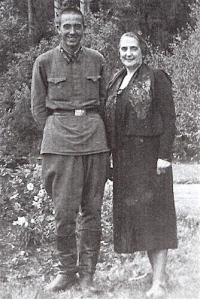
Rubèn and his mother
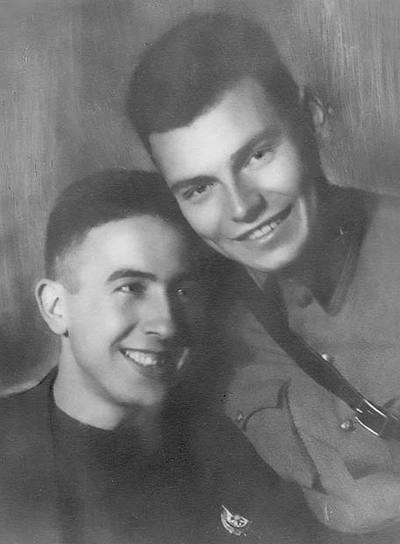
Rubèn and Artem Sergeev (who married Ruben's sister Amaya)
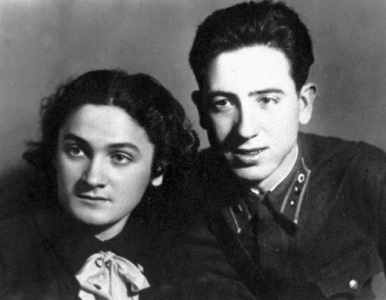
Rubèn's sister Amaya and Ruben

The body of Rubén is buried in Mamayev Kurgan, a cemetery dedicated to the heroes of Stalingrad. Dolores Ibárruri gives the last goodbye to her son.
Monumet for Rubén Ruiz Ibárruri
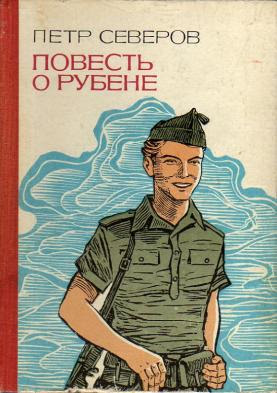
Book about Rubén Ruiz Ibárruri's life